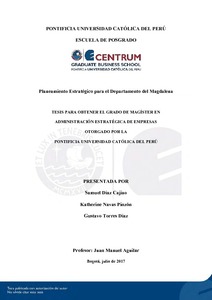| dc.contributor.advisor | Aguilar Rengifo, Juan Manuel | |
| dc.contributor.author | Díaz Cajiao, Samuel | es_ES |
| dc.contributor.author | Navas Pinzón, Katherine | es_ES |
| dc.contributor.author | Torres Díaz, Gustavo | es_ES |
| dc.date.accessioned | 2017-07-14T15:18:24Z | |
| dc.date.available | 2017-07-14T15:18:24Z | |
| dc.date.created | 2017 | |
| dc.date.issued | 2017-07-14 | |
| dc.identifier.uri | http://hdl.handle.net/20.500.12404/8999 | |
| dc.description.abstract | El plan estratégico del Departamento del Magdalena (Colombia), tomando como guía
el Modelo Secuencial del Proceso Estratégico, pretende a través de un análisis situacional y
diagnóstico del departamento definir sus potenciales y proponer planes de acción para la
explotación de estos. Así mismo, se identifican debilidades y aspectos de mejora que no han
permitido la alineación del departamento con el plan de Competitividad del País.
Magdalena es unos de los 32 departamentos de Colombia que cuenta con una
ubicación geográfica privilegiada por su salida al mar y actividad portuaria; se caracteriza por
hacer parte de unos de los tres corredores principales de la Red de Vías Nacional, igualmente
posee salidas aéreas, red fluvial y férrea. También cuenta con actividades económicas en el
sector hotelero y turismo, agropecuario y ganadero; poseedor de riqueza y variedad de
recursos naturales.
Sin embargo, existen situaciones de pobreza, baja cobertura del sistema educativo y
de salud y una predominante concentración de la actividad industrial en la capital Santa
Marta; adicionalmente la coyuntura del país en relación al conflicto armado y decrecimiento
de los índices macroeconómicos lo hacen más vulnerable.
La visión del Departamento para el año 2027 es liderar entre los primeros del país por
sus índices de competitividad a través del impulso de sectores claves como la educación,
turismo, exportaciones, seguridad y transparencia de las instituciones con un fuerte
componente de inclusión social.
Para la consecución de esta visión el departamento debe trabajar en incrementar su
participación del PIB pasando del 1,3% actual a un 8% para 2027, trabajar en el aumento de
23 puntos porcentuales en el índice de percepción de favorable en la seguridad, disminuir la
brecha social que la pobreza actualmente genera y reducir a la mitad la tasa de desempleo que
hoy es cercana al 8% | es_ES |
| dc.description.abstract | The strategic plan of the Magdalena Department (Colombia), using as a guide the
Sequential Model of the Strategic Process, intends through a situational analysis and
diagnosis of the department, to define its potential and propose action plans for the
exploitation of these. It also identifies weaknesses and aspects of improvement that have not
allowed the alignment of the department with the Country's Competitiveness Plan.
Magdalena is one of the 32 departments of Colombia that counts on a privileged
geographical location by its direct exit to the sea and port activity; is characterized for being
part of one of the three main corridors of the National Roads Network, also has aerial exits,
river navigability and rail network. It also has economic activities in the hotel sector and
tourism and agriculture; a potential source of wealth and variety of natural resources.
However, there are situations of poverty, low coverage in education and health
systems and a predominant concentration of industrial activity in the capital Santa Marta;
additionally the country's situation in relation to the internal conflict and decrease of the
macroeconomic indexes make it more vulnerable.
The Department's vision for the year 2027 is to lead among the first of the country by
its competitiveness indexes through the impulse of key sectors such as education, tourism,
exports, security and transparency of institutions with a strong component of social inclusion.
In order to achieve this vision, the department must work to increase its share of the
GDP, going from the current 1.3% to 8% by 2027, working on a 23% increase in the
perception of a favorable security, decreasing the social gap that poverty currently generates
and to reduce by half the unemployment rate that today is close to 8% | es_ES |
| dc.language.iso | spa | es_ES |
| dc.publisher | Pontificia Universidad Católica del Perú | es_ES |
| dc.rights | info:eu-repo/semantics/openAccess | es_ES |
| dc.rights.uri | http://creativecommons.org/licenses/by-nc-nd/2.5/pe/ | * |
| dc.subject | Desarrollo regional -- Colombia -- Magdalena | es_ES |
| dc.subject | Planificación regional -- Colombia -- Magdalena | es_ES |
| dc.title | Planeamiento estratégico para el Departamento de Magdalena | es_ES |
| dc.type | info:eu-repo/semantics/masterThesis | es_ES |
| thesis.degree.name | Maestro en Administración Estratégica de Empresas | es_ES |
| thesis.degree.level | Maestría | es_ES |
| thesis.degree.grantor | Pontificia Universidad Católica del Perú. CENTRUM | es_ES |
| thesis.degree.discipline | Administración Estratégica de Empresas | es_ES |
| renati.advisor.dni | 08246316 | |
| renati.discipline | 413307 | es_ES |
| renati.level | https://purl.org/pe-repo/renati/level#maestro | es_ES |
| renati.type | https://purl.org/pe-repo/renati/type#tesis | es_ES |
| dc.publisher.country | PE | es_ES |
| dc.subject.ocde | https://purl.org/pe-repo/ocde/ford#5.02.04 | es_ES |






